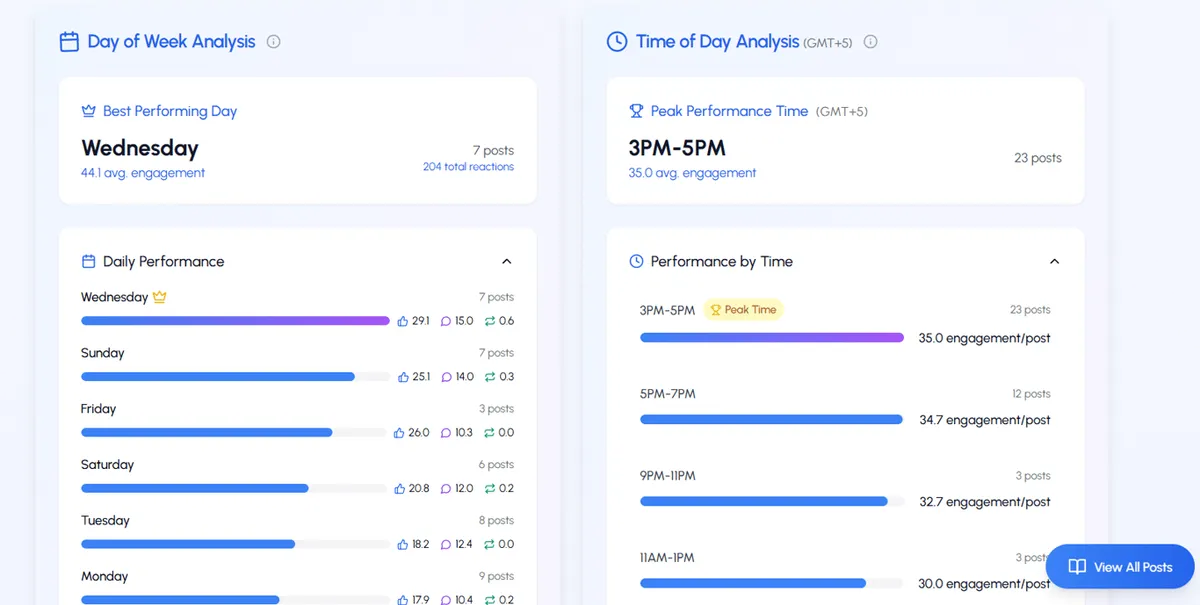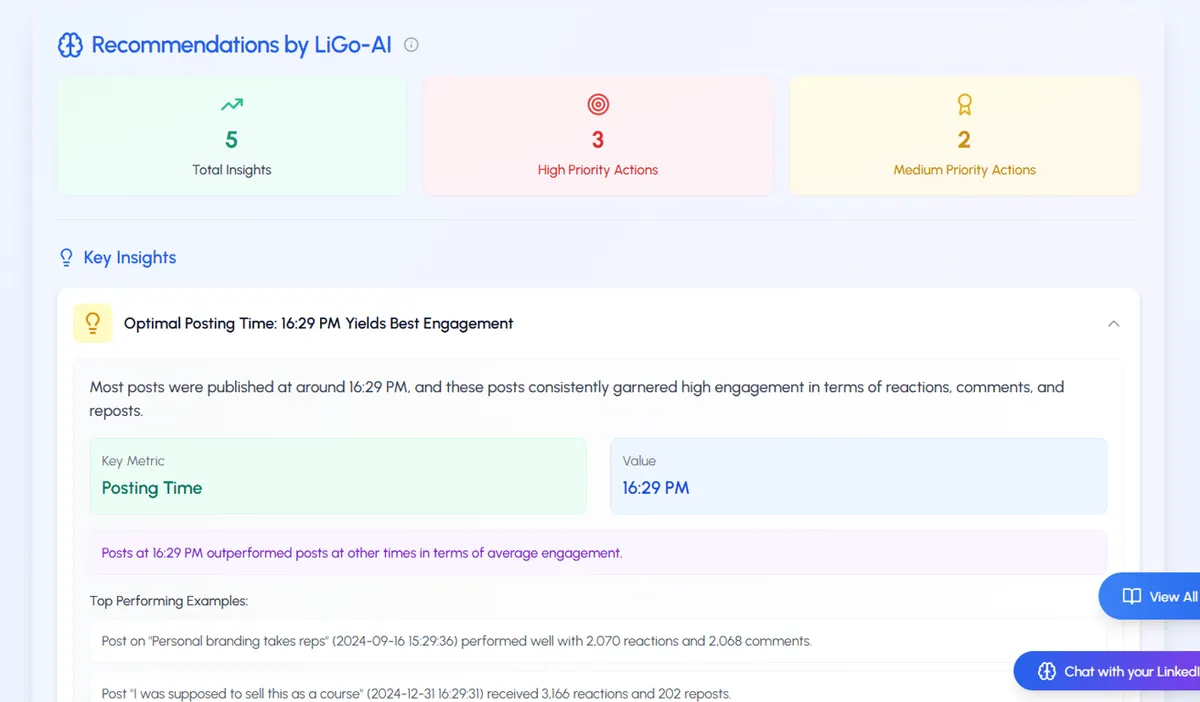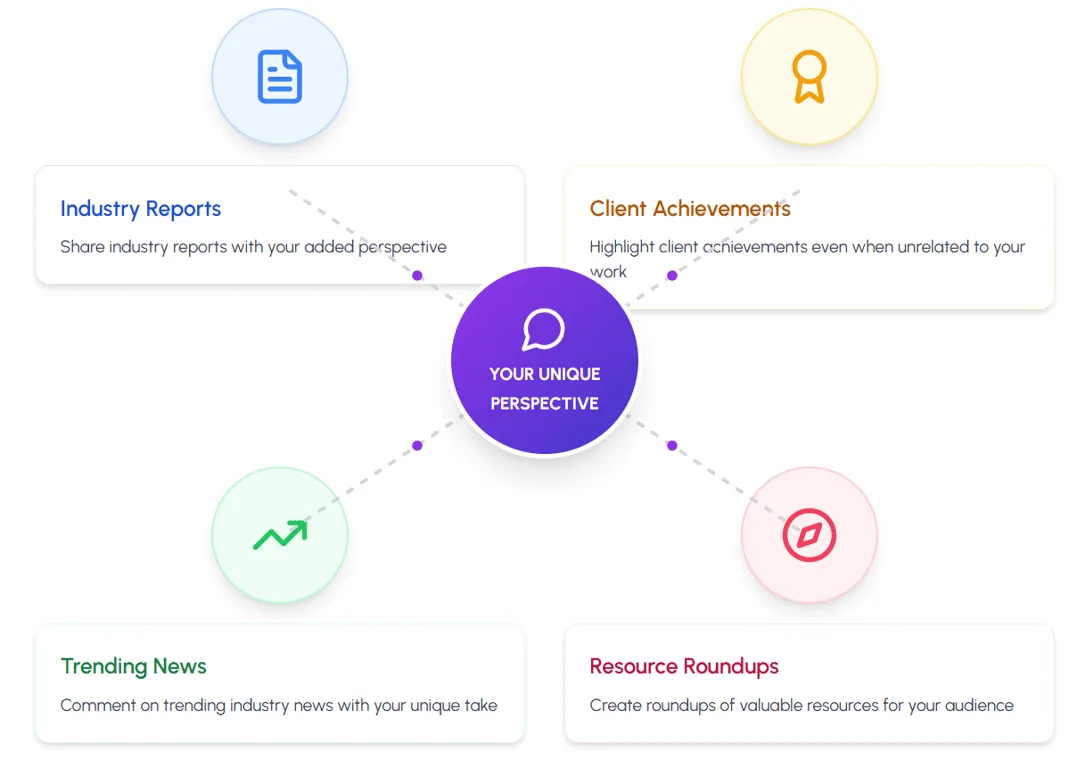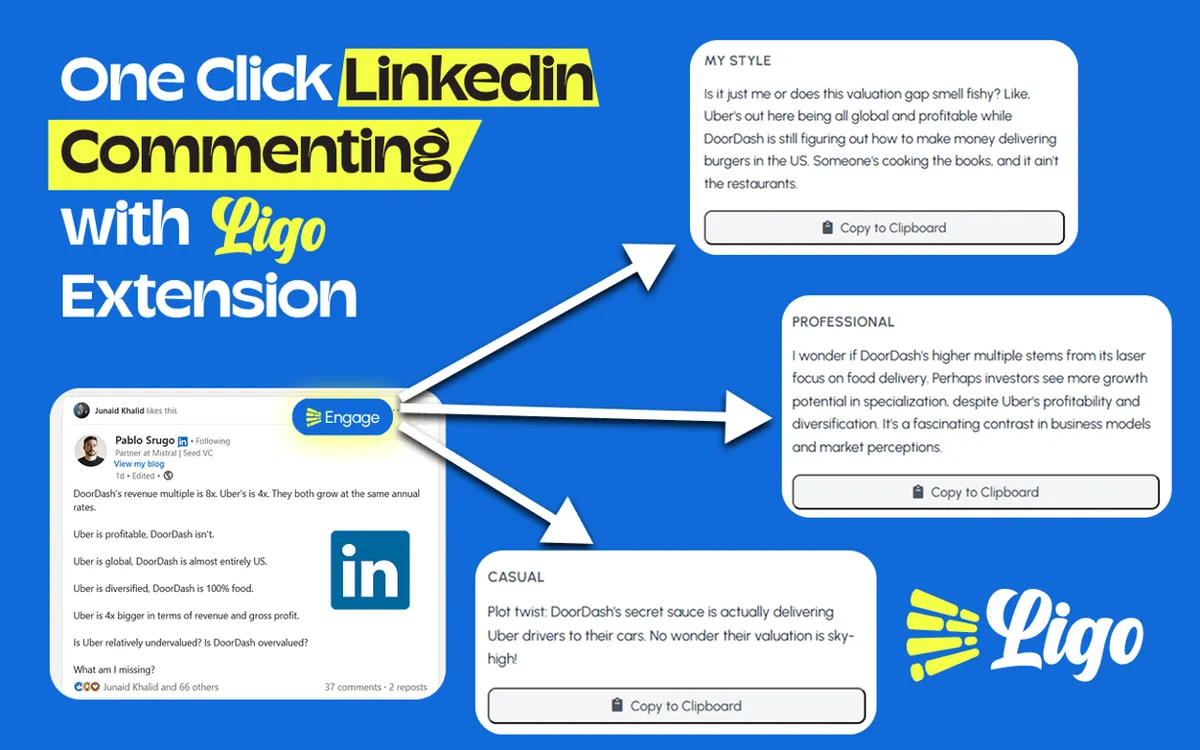For agency owners and founders, LinkedIn has become an indispensable platform for business growth. With 96% of B2B marketers using LinkedIn for marketing, the opportunity is clear-yet few professionals have mastered the art of consistent, strategic content creation that actually drives conversions. This comprehensive guide will walk you through building a LinkedIn content marketing strategy specifically designed for busy professionals who need results, not just engagement.
Why LinkedIn Content Marketing Matters for Agency Owners
LinkedIn's unique position as the premier professional network creates unparalleled opportunities for agency growth:
The Business Impact Is Measurable
Unlike other platforms where ROI can be nebulous, LinkedIn content marketing delivers concrete business results. Adobe's research found that LinkedIn content influenced 42% of their successfully closed B2B deals, demonstrating the platform's direct impact on revenue generation.
For agency owners, this translates to a clear path from content to clients-when done correctly. Our guide on using LinkedIn for lead generation shows similar patterns across multiple industries.
Your Ideal Clients Are Already There
With over 849.6 million users globally and 66.8 million monthly active users in the U.S. alone, LinkedIn provides access to a concentrated pool of decision-makers. The platform hosts 65 million decision-makers and 61 million senior-level influencers-precisely the audience agency owners need to reach.
The Competition Is Doing It Wrong
Despite widespread adoption, most businesses approach LinkedIn content marketing ineffectively. They either post sporadically without strategy or focus exclusively on self-promotion. This creates a significant opportunity for agencies that implement a thoughtful, value-driven approach, as we've documented in our LinkedIn growth strategy guide.
Building Your LinkedIn Content Strategy: A 7-Step Framework
Creating an effective LinkedIn content strategy requires a systematic approach tailored to your agency's specific goals and audience. Here's how to build a framework that converts:
1. Define Clear, Measurable Objectives
Before creating any content, establish precisely what you want your LinkedIn strategy to accomplish:
Common objectives for agencies include:
-
Building brand awareness and authority in your niche
-
Generating qualified leads for your services
-
Nurturing existing client relationships
-
Attracting top talent to your team
-
Establishing thought leadership in your industry
Implementation tip: Select no more than two primary objectives and define specific metrics for each. For example, if lead generation is your goal, track website visits from LinkedIn, contact form submissions, and ultimately, new client acquisitions attributed to LinkedIn.
For a deeper dive into strategic goal-setting, see our LinkedIn for agency owners guide.
2. Develop a Deep Understanding of Your Audience
The most effective LinkedIn content speaks directly to the specific challenges and aspirations of your ideal clients.
For agency owners, this means:
-
Identifying the specific industries and company sizes you serve
-
Understanding the job titles and roles of your decision-makers
-
Researching the professional challenges they face daily
-
Determining what content formats they prefer and engage with
-
Analyzing when they're most active on the platform
Implementation tip: Create 2-3 detailed audience personas that represent your ideal clients. Include their industry, role, challenges, goals, and content preferences. Use LinkedIn Analytics to refine these personas based on who actually engages with your content.
3. Establish Your Content Pillars
Content pillars are the core topics that align with both your expertise and your audience's interests. They provide structure to your content strategy and establish your agency's positioning.
Effective content pillars for agencies typically include:
-
Industry insights and trend analysis
-
Strategic approaches to common client challenges
-
Behind-the-scenes agency processes and methodologies
-
Client success stories and case studies
-
Professional development for your industry
Implementation tip: Limit yourself to 3-5 content pillars to maintain focus. For each pillar, create a list of specific subtopics that can be developed into individual posts.
This approach aligns with our strategy for creating your LinkedIn content theme, which emphasizes focused expertise over scattered content.
4. Develop a Strategic Content Mix
Variety in content formats keeps your audience engaged while addressing different stages of the client journey.
Your LinkedIn content mix should include:
Thought Leadership Content (30%)
-
Industry analysis and predictions
-
Original research and insights
-
Commentary on emerging trends
Educational Content (40%)
-
How-to guides and tutorials
-
Process breakdowns
-
Strategic frameworks
Social Proof Content (20%)
-
Client success stories
-
Case studies
-
Testimonials and reviews
Promotional Content (10%)
-
Service offerings
-
Special announcements
-
Direct calls-to-action
Implementation tip: Create a content calendar that balances these different content types throughout the month. Ensure promotional content is always balanced with substantial value-driven content.
Our guide on LinkedIn content calendar creation provides templates and scheduling strategies to maintain this balance.
5. Optimize Content Formats for LinkedIn's Algorithm
LinkedIn's algorithm favors certain content types and structures. Understanding these preferences helps maximize your content's reach and engagement.
High-performing LinkedIn formats include:
Text-Based Posts
-
Personal stories with professional lessons
-
Listicles with actionable insights
-
Question-based posts that invite engagement
-
Contrarian perspectives on industry norms
Visual Content
-
Carousel documents (PDF slides)
-
Native video content (under 3 minutes)
-
Custom graphics with data visualizations
-
Behind-the-scenes images
Interactive Content
-
Polls on industry-relevant topics
-
"This or That" comparison posts
-
Fill-in-the-blank engagement prompts
Implementation tip: Test different formats with similar content to identify which resonates best with your specific audience. Pay attention to both reach and engagement metrics when evaluating performance.
For specific formatting techniques, see our LinkedIn post formatting guide.
6. Implement a Consistent Publishing Schedule
Consistency is crucial for building an engaged audience on LinkedIn. Your publishing schedule should balance frequency with quality and sustainability.
For most agencies, an effective schedule includes:
-
3-5 posts per week on your company page
-
2-3 posts per week from key team members' personal profiles
-
1-2 longer-form articles or documents monthly
-
Quarterly premium content pieces (research reports, guides, etc.)
Implementation tip: Batch content creation in dedicated sessions rather than trying to create posts daily. A single 2-3 hour session can generate weeks of content, which can then be scheduled for optimal posting times.
Our research on the best time to post on LinkedIn can help you maximize visibility within your specific industry.

7. Measure Results and Refine Your Approach
Regular analysis of your content performance allows you to continuously improve your strategy based on data rather than assumptions.
Key metrics to track include:
-
Engagement rate (reactions, comments, shares)
-
Click-through rate to your website
-
Content-attributed leads and conversions
-
Audience growth and quality
-
Post reach and impressions
Implementation tip: Establish a monthly review process to analyze these metrics and identify patterns in your highest-performing content. Use these insights to refine your content pillars, formats, and posting schedule.
For a comprehensive approach to performance tracking, refer to our LinkedIn analytics guide.

Content Creation Strategies for Time-Strapped Agency Owners
As a busy agency owner, creating consistent, high-quality LinkedIn content can seem daunting. These strategies help streamline the process without sacrificing quality:
Content Batching and Repurposing
Instead of creating content daily, implement a batching system:
-
Schedule dedicated content creation blocks (2-4 hours weekly or monthly)
-
Create content templates for recurring formats
-
Develop content series around a single topic
-
Repurpose existing content from other channels
For example, a single client case study can be transformed into:
-
A carousel document highlighting key results
-
Several text posts focusing on different aspects of the strategy
-
A video testimonial from the client
-
An article detailing the complete process
This approach is detailed in our guide on LinkedIn content repurposing.
Leverage Your Team's Expertise
Your agency's collective knowledge is a valuable content resource:
-
Implement a content contribution system where team members share insights from their work
-
Conduct internal interviews to extract expertise from specialists
-
Create collaborative content that showcases multiple team perspectives
-
Highlight team members as subject matter experts
This approach not only diversifies your content but also strengthens your employer brand and team engagement. Our guide on employee advocacy on LinkedIn provides a framework for implementing this strategy.
Curate Valuable Third-Party Content
Not all content needs to be original. Strategic curation demonstrates your agency's industry awareness:
-
Share industry reports with your added perspective
-
Highlight client achievements even when unrelated to your work
-
Comment on trending industry news with your unique take
-
Create roundups of valuable resources for your audience
The key is adding your perspective rather than simply sharing links-this positions your agency as a thoughtful industry participant.

Common LinkedIn Content Marketing Mistakes to Avoid
Even experienced marketers make these common mistakes when implementing LinkedIn content strategies:
Focusing on Quantity Over Quality
The mistake: Posting frequently without strategic value, resulting in low-quality content that dilutes your brand.
The solution: Prioritize substantive, valuable content even if it means posting less frequently. One thoughtful, insightful post per week is more effective than daily posts lacking depth.
Excessive Self-Promotion
The mistake: Using LinkedIn primarily as a broadcast channel for agency announcements and promotions.
The solution: Follow the 80/20 rule-80% of content should provide value to your audience, while only 20% should be directly promotional.
This balance is emphasized in our guide on LinkedIn for business growth, which shows how value-driven content outperforms promotional content in both reach and conversion.
Inconsistent Brand Voice
The mistake: Posting content with wildly varying tones, perspectives, and quality levels.
The solution: Develop clear brand voice guidelines for LinkedIn and ensure all content creators understand and implement them consistently.
Neglecting Community Engagement
The mistake: Posting content without actively participating in conversations within your industry.
The solution: Allocate time for engagement with your network-commenting on others' posts, responding to comments on your content, and participating in relevant group discussions.
Our research on LinkedIn comment strategies shows that strategic engagement can amplify content reach by up to 40%.

How LiGo Transforms LinkedIn Content Marketing for Agencies
For agency owners juggling multiple responsibilities, LiGo offers a comprehensive solution to LinkedIn content marketing challenges:
Theme-Based Content Generation
LiGo's theme-based approach allows you to define your content pillars once, then consistently generate ideas aligned with your expertise and audience interests. This ensures all content remains on-strategy without requiring constant strategic oversight.
The platform's content themes feature helps you maintain focus on your core expertise areas while generating fresh perspectives on your established topics.
Streamlined Content Creation
With LiGo, you can transform ideas into complete LinkedIn posts with customizable variants, saving hours of writing time. The platform maintains your authentic voice while handling the heavy lifting of content creation.
This is particularly valuable for agency owners who understand the importance of LinkedIn but struggle to find time for consistent content creation. As one agency owner noted: "LiGo reduced my content creation time from 5 hours to 45 minutes per week, while actually improving quality and consistency."
Integrated Scheduling
LiGo's scheduling capabilities allow you to plan your content calendar within a single platform, ensuring consistent posting even during your busiest periods.
The system recommends optimal posting times based on your audience activity patterns, maximizing visibility without requiring manual timing analysis.
Analytics Integration
Track performance and optimize your content strategy based on engagement data, identifying which topics and formats resonate most with your audience.
LiGo's analytics dashboard provides insights specifically designed for agency owners, focusing on metrics that indicate business impact rather than vanity metrics.
Case Study: Agency Owner Success with Strategic Content Marketing
Sarah, an agency owner specializing in digital marketing services, implemented the framework outlined in this guide using LiGo to streamline her process.
Before:
-
Posting sporadically (1-2 times per week)
-
No clear content strategy or themes
-
Primarily sharing industry news with little original insight
-
Minimal engagement (average 5-10 interactions per post)
-
No measurable business results from LinkedIn
Implementation:
-
Defined three core content pillars aligned with her agency's services
-
Created a consistent publishing schedule (4 posts weekly)
-
Developed a strategic content mix with 40% educational content
-
Used LiGo to generate and schedule content in batches
-
Implemented a monthly performance review process
Results after 90 days:
-
183% increase in overall engagement
-
47% growth in profile visitors
-
12 qualified leads directly attributed to LinkedIn content
-
3 new client acquisitions worth $78,000 in annual revenue
-
65% reduction in time spent on content creation
This case demonstrates how a strategic approach to LinkedIn content marketing can drive meaningful business results for agency owners.
Conclusion: Building a Sustainable LinkedIn Content Engine
For agency owners and founders, LinkedIn content marketing isn't just about visibility-it's about creating a sustainable system that consistently generates business opportunities while respecting your limited time.
The most effective LinkedIn content strategies combine:
-
Clear business objectives tied to measurable outcomes
-
Deep understanding of your ideal clients' needs and challenges
-
Consistent, valuable content that positions your agency as an authority
-
Efficient creation processes that maximize impact while minimizing time investment
-
Regular analysis and optimization based on performance data
By implementing the framework and strategies outlined in this guide, you can transform LinkedIn from a time-consuming obligation into a powerful engine for agency growth-generating qualified leads, establishing industry authority, and building valuable relationships that convert into business opportunities.
Remember that LinkedIn content marketing is a marathon, not a sprint. The agencies that see the greatest success are those that commit to consistent value delivery over time, gradually building an audience of engaged prospects who view them as trusted advisors rather than just another service provider.
Ready to implement a LinkedIn content marketing strategy that actually converts? Try LiGo today and discover how our theme-based approach can help you create consistent, high-quality content that drives real business results.
Related Resources
Want to further enhance your LinkedIn content strategy? Check out these related guides:




